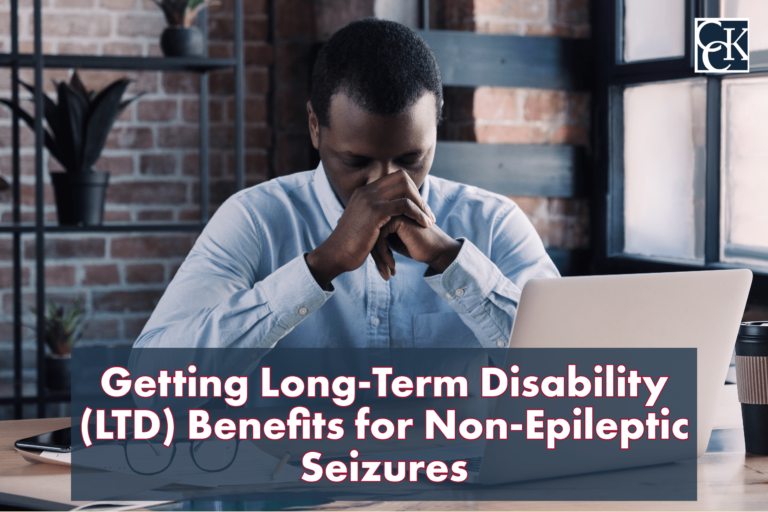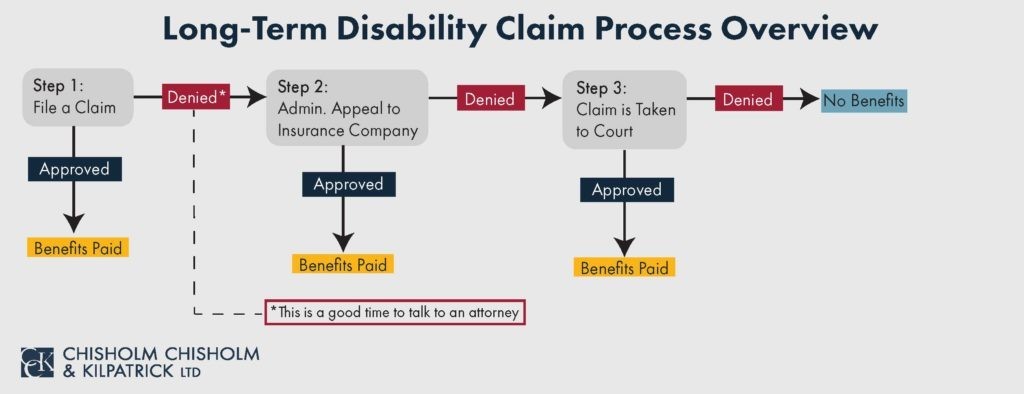Getting Long-Term Disability (LTD) Benefits for Non-Epileptic Seizures

Non-epileptic seizures (NES), also known as “dissociative seizures” or “psychogenic non-epileptic seizures” (PNES), are seizures that are not associated with epilepsy. This means that the seizures are not a result of abnormal electrical activity within the brain. While non-epileptic seizures are not associated with epilepsy, the seizure episodes are just as frightening and disruptive. This condition affects women more than men and is known to start in young adulthood—though it can start at any time. Seizures, regardless of their underlying cause, can significantly impact a person’s life and make them unable to work.
If you have non-epileptic seizures that are negatively affecting your capability to work, you may be able to file for long-term disability benefits. Under long-term disability, you can receive monthly payments that equal a percentage of your total income, which helps you get by while ensuring that you can focus on managing your health.
The long-term disability attorneys at Chisholm Chisholm & Kilpatrick can assist you in making a strong case for LTD benefits resulting from your non-epileptic seizures. Call us today for a free consultation with a member of our team at (800) 544-9144.
What are Non-Epileptic Seizures?
Non-epileptic seizures differ from epileptic seizures because of the underlying causes that produce them. A variety of issues can cause non-epileptic seizures, including physical problems, such as low blood pressure or heart issues, and mental or emotional traumas. For example, a person may have experienced a frightening or upsetting event in their past that they have suppressed; their reaction to the remembrance of these events can trigger a physical reaction, i.e., a seizure. This happens when a person cannot knowingly handle the trauma they are suppressing.
There are many emotional events that can lead to someone experiencing non-epileptic seizures, including the death of a loved one; a divorce; physical abuse; verbal abuse; war experiences; and more. These seizures may happen spontaneously. Regardless of whether the seizures occur spontaneously or not, the person has no control over them.
These types of seizures may begin immediately after the traumatic event, but often do not begin until years later. Stressful and anxious situations can trigger them, but sometimes they can happen randomly or because the person is afraid of having another seizure. The seizures are harrowing for those who experience them as they may endure screaming, relieving past events, or crying.
Symptoms of Non-Epileptic Seizures
Several symptoms associated with non-epileptic seizures exist, although they can be very similar to other types of seizures as well. These symptoms include:
- Heart palpitations;
- Hyperventilation;
- Sweating;
- Dry mouth;
- Temporary blindness;
- Tunnel vision;
- Loss of awareness;
- Loss of bodily sensations; and
- Loss of bodily control.
As the abovementioned symptoms illustrate, non-epileptic seizures are no less disruptive than other seizures, and they can significantly alter the quality of life of the person suffering from them. Moreover, these symptoms can make working impossible. Thus, long-term disability insurance benefits are critical.
Diagnosis and Treatment
A specialist, usually a neurologist, diagnoses non-epileptic seizures. When you experience seizures, you may not know the underlying cause. However, it is important to have an open dialogue with your physician about them so that they can refer you to the right specialist to get a proper diagnosis.
Your specialist will try and rule out epilepsy as a cause for your seizures. To do this, they will often ask you questions regarding your seizures, including when they began, how they occur, and how long they last. Furthermore, they will conduct certain tests to rule out abnormal electrical activity in your brain. These tests may include an EEG (electroencephalogram) or brain scans such as MRI and CT scans.
Treatment options depend on the cause of the seizures, i.e., whether they are emotional or physical. Doctors will not use anti-epileptic drugs (AEDs) to treat non-epileptic seizures. Instead, your doctor may prescribe anti-depressants if the underlying cause is emotional. Depression is often associated with NES. However, the most common form of treatment is usually psychotherapy, also known as “talk therapy.”
Psychiatrists and psychologists administer psychotherapy. Moreover, doctors also recommend a type of psychotherapy called cognitive behavioral therapy (CBT) in certain instances because it focuses on changing negative thinking or behavior patterns, which is helpful when a traumatic event from the past is causing seizure events.
Non-Epileptic Seizures and Your Long-Term Disability Claim
A non-epileptic seizure diagnosis is difficult news to receive, and it can make each day seem challenging to navigate. People who suffer from non-epileptic seizures never know when an episode will occur, and this can put them into a constant state of anxiety, which leads to a lack of focus. Adequately performing the duties of their job can feel impossible.

When a medical condition impairs your ability to work, you may need to file a long-term disability claim. While many claimants handle these claims by themselves, a dedicated LTD attorney will have the experience necessary to help navigate you through the process. The attorneys at Chisholm Chisholm & Kilpatrick understand how stressful this is and will help gather all necessary evidence to prove you require your long-term disability benefits.
Chisholm Chisholm & Kilpatrick Can Help You with Your Long-Term Disability Claim
Filing a long-term disability claim is an overwhelming process to complete. However, when you have non-epileptic seizures that prevent you from working, it is a necessary step so that you can focus on treating your condition. The long-term disability lawyers at Chisholm Chisholm & Kilpatrick understand this and want to help you so that you can begin receiving your benefits.
Our legal team has over thirty years of experience dealing with insurance companies and know how they operate. It is important to remember that, if they can, insurance companies will find any reason to avoid paying benefits. Your LTD policy has a lot of invaluable information, however, that can help you prepare and prevent these denials from happening. Perhaps the most important piece of information within your policy is the definition of disability, which dictates what terms your condition must meet in order to receive benefits.

Our team will thoroughly evaluate your policy and determine the best evidence to gather to prove you meet your definition of disability. We utilize various forms of evidence beyond just medical records. This supplemental evidence strengthens your claim and shows how your non-epileptic seizures affect you, both privately and in the workplace.
If you have a group policy through your employee benefits, then it is most likely governed by ERISA law. This is important because ERISA has many strict deadlines. Moreover, under ERISA law, the last stage in which you may submit new evidence is the appeal stage. For example, ERISA does not allow you to submit new evidence if your claim were to go to litigation after a denied appeal. Our ERISA attorneys have the expertise to gather the right evidence early on so you can avoid missteps and wrongful denials of your claim.
CCK knows that conditions like non-epileptic seizures can significantly change your life and impair your ability to work, and we will do everything we can to fight for your benefits. Moreover, once your insurance company approves your benefits, we will continue to represent you and serve as a point of contact between you and your insurance company so that you may retain your benefits and continue to focus on managing your condition.
Call CCK Today for a Free Consultation Concerning Your LTD Claim
Chisholm Chisholm & Kilpatrick is here to help you with your long-term disability claim. We understand how debilitating a diagnosis of non-epileptic seizures can be. We want to alleviate the burden of filing a claim or appealing a denial so that you can focus on your well-being.
Call us today for a free consultation with a member of our team concerning your claim at (800) 544-9144.

Share this Post